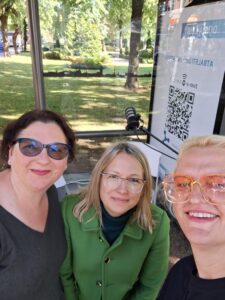By Rasma Pipike, Creative Ideas
On July 5-6, 2024, the vibrant Latvian town of Cēsis became a hub for meaningful dialogue as 20,000 attendees gathered for the LAMPA Conversation Festival. The “Think Slowly” series stood out among the festival’s many initiatives, presented by the Association – Creative Ideas – Latvia in collaboration with the Latvian Association of Young Researchers (LJZA). This engaging campaign was part of the EU’s “ARENAS project”, dedicated to understanding and countering extremist narratives—a timely and crucial mission in today’s polarized world.
 The “Think Slowly” series, inspired by Daniel Kahneman’s renowned book “Thinking, Fast and Slow”, urged festival-goers to adopt slower, more deliberate thinking when processing information. With science often overlooked in public discourse, the initiative aimed to elevate awareness of Latvian scientific achievements and foster a culture of critical thinking—an essential skill in combating disinformation and extremist rhetoric.
The “Think Slowly” series, inspired by Daniel Kahneman’s renowned book “Thinking, Fast and Slow”, urged festival-goers to adopt slower, more deliberate thinking when processing information. With science often overlooked in public discourse, the initiative aimed to elevate awareness of Latvian scientific achievements and foster a culture of critical thinking—an essential skill in combating disinformation and extremist rhetoric.
From the “World’s Smallest Stage,” young researchers captivated audiences with thought-provoking interviews. Alise Vītola, a researcher within the ARENAS project, shed light on the mechanisms behind extremist narratives. Alise showed how economic inequality and institutional mistrust provide favourable ground for extremism. Latvian researchers team of Rasma Pipike and Alise Vītola will give insights to bridge the gap between academic research and societal challenges, resonating with attendees from diverse backgrounds.
Alise’s explanations illustrated that national issues echo broader European challenges, underscoring the relevance of the ARENAS project. Historical lessons, such as the rise of Nazi Germany during periods of societal mistrust and inequality, served as powerful reminders of the consequences of unchecked extremism.
By creating a space for dialogue and emphasising the importance of methodical, slow thinking, the LAMPA Festival did more than entertain—it empowered. The activities showcased how science and critical thinking can counter extremist ideologies and build a more empathetic, informed society.
